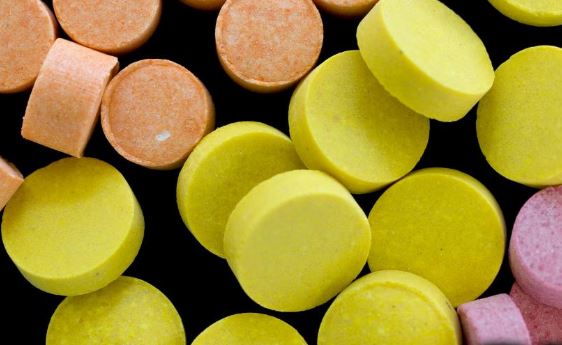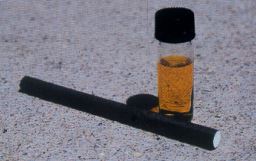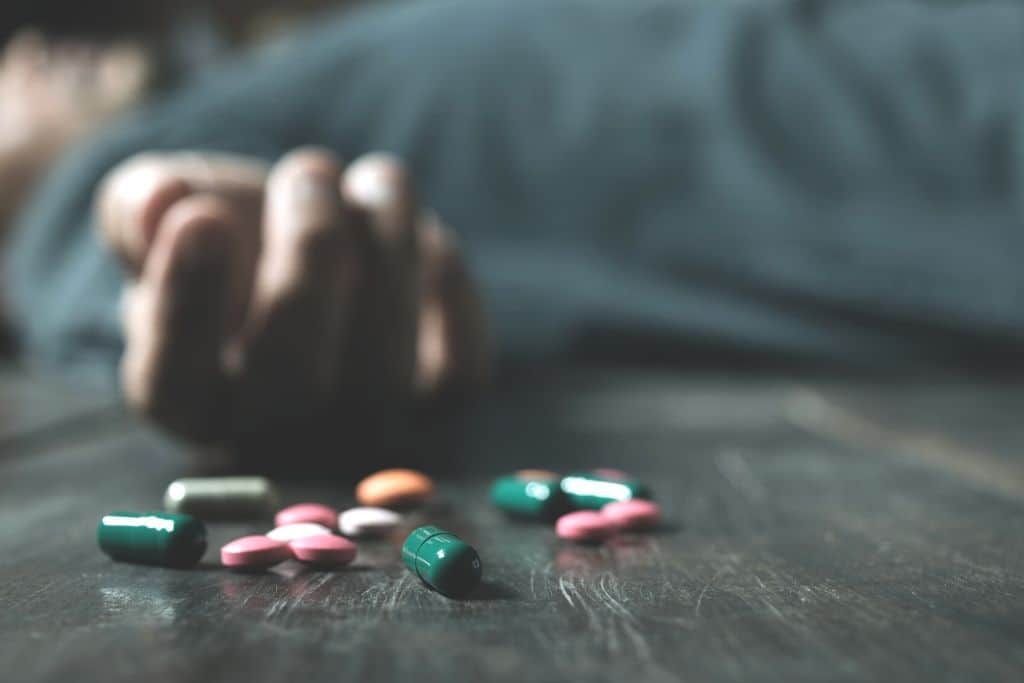The Angel Dust Drug (Phencyclidine)
The dug Angel dust is a slang term for the illicit PCP drug phencyclidine. It’s a powerful dissociative anesthetic that can produce a sense of numbness and detachment from reality, along with intense hallucinations and unusual behavior.
Angel dust drugs have re-emerged as a popular substance of abuse this decade since its decline after the 1980s. Like ketamine, PCP or Angel Dust was formerly used as a pre-induction anesthetic and animal tranquilizer. Hence it has street names such as “horse tranquilizer,” “hog,” and “elephant”. It was prized for its ability to provide anesthesia and analgesia or the inability to feel pain without triggering cardiorespiratory depression. Still, it was soon recalled when patients experienced psychosis, agitation, and dysphoria post-surgical use.
What is Angel Dust Drug Chart? Angel Dust Meaning & Effects.
| What is Angel Dust | Angel Dust Meaning & Effects |
| Angel Dust is | Hallucinogen, stimulant, anesthetic, or painkiller, depending on how much is taken. Angel Dust is known by street names for PCP, like Angel Dust, Supergrass, and Rocket Fuel. |
| What Does Angel Dust Look Like? | On the street, Angel Dus is frequently sold as a white powder. Angel Dust is also sold as a liquid, capsule, or tablet. |
| How is Angel Dust Used? | As a powder, Angel Dust is snorted. In liquid form, Angel Dust is often injected. As a tablet or capsule, it’s ingested. Angel Dust’s powder is often mixed with tobacco or cannabis and then smoked. |
| Angel Dust Effects | Angel Dust affects the mind and the senses. Users may see and hear things that aren’t there. Hallucinogens also affect a person’s emotions and ability to think clearly. |
| Long-term Angel Dust Effects | Some people who have abused Angel Dust for a long time have memory loss, speech problems, long-term anxiety, and depression and do not enjoy social situations. |
What Drug is Angel Dust/PCP (What is Angel Dust)?
What is angel dust? Phencyclidine (PCP, “angel dust drug”) is an infamous hallucinogenic sought for its ability to induce the illusion of euphoria, omnipotence, superhuman strength, and social and sexual prowess. The acronym PCP stems from its organic name, 1-(1-phenyl cyclohexyl) piperidine, which alludes to its relatively simple production from the arylcyclohexylamine piperidine.
Angel Dust drug (PCP or phencyclidine) is a powerful substance linked to various mental health issues, including anxiety, depression, suicidal thoughts and behavior, paranoia, violent outbursts, and psychosis. Those with a history of mental health issues and those with a family history of mental health problems are particularly at risk of developing co-occurring disorders after using angel dust drugs.
Many people who seek professional care for PCP addiction don’t realize they are also struggling with another disorder. This is why selecting a center that can determine the full scope of your needs can be crucial and provide dual diagnosis programming if required. Without effective care to address your dual diagnosis, you may find it extremely difficult to achieve and maintain long-term recovery from PCP addiction.
Angel Dust Meaning & Originations
The origin of the slang term “angel dust” for phencyclidine (PCP) is thought to be due to the drug’s ability to produce a variety of distorted, euphoric, and dissociative sensations that might seem “heavenly” or “magical” in some way. The name ‘angel’ may have also been coined to contrast with the severe negative effects that some users experience, such as panic attacks and psychosis.
The slang term “angel dust” for phencyclidine (PCP) is also derived from the popular powdered dust like state of the drug.
Angel Dust can be consumed by smoking, snorting, injection, or ingestion. Angel Dust can cause hallucinations, paranoia, agitation, delusions, and disinhibition. It is a highly addictive and dangerous drug that can lead to serious medical and psychiatric complications, including seizures, coma, and death.
Angel dust drug can severely impact health and life, including addiction, difficulty maintaining relationships or performing daily functions, and even causing accidents or injuries. It’s always best to seek professional help if you’re struggling with substance abuse, addiction, or mental health issues.
It’s essential to seek professional help if someone is struggling with PCP addiction or substance abuse, as it is challenging to quit addiction without proper treatment.
Angel Dust Drug Uses & Possible Health Effects
The immediate effects of PCP typically last for 4-6 hours and vary depending on the dosage. Depending on the dose and route of administration, PCP can have a wide range of central nervous system (CNS) manifestations. Emergency department providers should become familiar with managing patients with PCP toxicity since rhabdomyolysis, hypoglycemia, seizures, hypertensive crisis, coma, and trauma are several complications that can arise with PCP use.
Short-term Symptoms of Angel Dust Drug Use
Delusions, hallucinations, paranoia, problems thinking, a sense of distance from one’s environment, and anxiety.
- Low Doses:
- Slight increase in pulse and breathing rate
- Increased blood pressure and heart rate
- Shallow breathing
- Face redness and sweating
- Numbness of the hands or feet
- Loss of coordination
- High Doses:
- Lowered blood pressure, heart rate, and breathing
- Nausea
- Vomiting
- Blurred vision
- Flicking up and down of the eyes
- Drooling
- Loss of balance
- Dizziness
- Violence
- Suicidal thoughts
- Seizures, coma, and death.
Angel Dust Drug Pics
Angel Dust is a white crystal or powder that can be ingested, snorted, smoked, ingested, or injected.

Skip To:
Learn More:
Long-term Consequences of Angel Dust Drug Use and Health Effects
Memory loss, problems with speech and thinking, depression, psychosis, weight loss, and anxiety. Other health-related issues may include self-injury and the risk of HIV, hepatitis, and other infectious diseases from shared needles.

Get Your Life Back
Find Hope & Recovery. Get Safe Comfortable Detox, Addiction Rehab & Dual Diagnosis High-Quality Care.
Hotline(844) 597-1011Angel Dust Drug (Phencyclidine) Facts
What is Angel Dust?
The drug Angel dust is a very dangerous substance and can be life-threatening if taken in large doses or combined with other drugs or alcohol. It is illegal and not recommended for recreational use. If you or someone you know is struggling with an addiction to angel dust, please reach out for help.
What is PCP Drug? What is Angel Dust?
The drug Angel Dust or PCP (Phencyclidine) is a dissociative drug developed as an intravenous anesthetic and has been discontinued due to serious adverse effects. Dissociative drugs are hallucinogens that cause the user to feel detached from reality.
PCP Street Names and Angel Dust Drug Slang
Angel Dust, Boat, Hog, Love Boat, Peace Pill, Angel Mist
What is PCP on a Drug Test?
PCP is not typically tested for on a standard drug test.
What Drug is Angel Dust Fact Sheet by DEA
The drug Angel Dist or PCP is addictive, often resulting in psychological dependence, craving, and compulsive behavior. PCP produces unpleasant psychological effects, and users often become violent or suicidal.
DEA Schedule / Legal Status: Schedule I, II / Illegal
Common Forms: White or colored powder, tablet, or capsule; clear liquid
Common Ways Taken: Injected, snorted, ingested, smoked (powder added to mint, parsley, oregano, or marijuana)
Common Commercial Names: No commercial uses
Medications: There are no FDA-approved medications to treat addiction to PCP or other dissociative drugs. Searched for “whats angel dust drug wiki?” Download below facts sheet provided by the DEA.
Angel Dust Drug / PCP Drug Statistics
According to the Substance Abuse and Mental Health Services Administration, angel dust drugs or PCP drugs are known to cause hallucinations similar to MDMA (3,4-methylenedioxy-N-methylamphetamine, also known as Ecstasy) and LSD (lysergic acid diethylamide), but unlike those drugs, PCP can lead to hostile behavior that may result in episodes of extreme violence.
PCP’s angel dust drugs users often feel detached or distant from their environment and can experience distorted sights and sounds. Severe symptoms of PCP use can include irregular breathing, seizures, and coma. Furthermore, users of angel dust drugs can become addicted to PCP and experience anxiety and suicidal ideation. Individuals experiencing negative health effects after using PCP may seek treatment or be brought by law enforcement to the ED for immediate care.
6.3 Million
6.3 million persons (2.4%) aged 12 or older have used PCP in their lifetime.
Source: NCBI
18 to 25
Almost 1% of people ages 18 to 25 have reported using PCP at some point.
Source: NCBI
72%
Approximately 7 out of 10 (72%) PCP-related visits involved other drugs combined with PCP.
Source: SAMHSA
Get Help. Get Better. Get Your Life Back.
Searching for Accredited Drug and Alcohol Rehab Centers Near You?
Even if you have failed previously and relapsed, or are in the middle of a difficult crisis, we stand ready to support you. Our trusted behavioral health specialists will not give up on you. When you feel ready or just want someone to speak to about therapy alternatives to change your life call us. Even if we cannot assist you, we will lead you to wherever you can get support. There is no obligation. Call our hotline today.
(844) 597-1011
Angel Dust Drugs Effects on the Brain
Phencyclidine (PCP) or angel dust drugs profoundly affect the central nervous system. Angel dust drug has numerous behavioral and neurochemical effects, such as inhibiting the uptake and facilitating the release of dopamine, serotonin, and norepinephrine.
As a mind-altering substance, Angel dust drug or PCP drug affects how people perceive themselves, their environments, and others. When using PCP drugs, a person may think that he or she has increased strength and that it is impossible to be harmed by dangerous situations. The person’s ability to think rationally disappears, which can lead to strange and violent behavior. This can become very dangerous for the person using the drug and other people who may be nearby.
If someone who has used angel dust drug is severely paranoid, agitated, or acting strangely, use the following strategies to help keep the person safe. Before getting involved, however, it is important to assess the situation and keep your own safety in mind as well:
- Bring the person to a safe, calm setting that is not crowded
- Remind the person that these feelings are due to a drug they used and that it should wear off
- If the person is experiencing an overdose, call 911 immediately
Can You Overdose on PCP or Angel Dust Drugs?
Yes. PCP use can harm a person’s body due to its sedative (downer) effects. Many individuals who use PCP are brought to emergency rooms because of the drug’s unpleasant mental effects. High amounts of PCP in a person’s system can lead to overdose, which can be deadly.
Furthermore, using angel dust drugs in combination with alcohol or benzodiazepines (Valium-like substances) can increase the risk of overdose significantly. It is best to avoid mixing drugs. If you suspect that someone is experiencing an overdose, call 911 immediately.
Symptoms of PCP overdose include:
- Agitation (overly excited, violent behavior)
- Altered state of consciousness
- Catatonic trance (the person does not talk, move, or react)
- Coma
- Convulsions or seizures
- Hallucinations
- High blood pressure
- Side-to-side eye movements
- Psychosis (loss of contact with reality)
- Uncontrolled movement
- Lack of coordination

All of these symptoms are severe. If you recognize them in someone using PCP drugs or angel dust drugs, call 911 immediately.
Before Calling Emergency
Have this information ready:
- Person’s age, weight, and condition
- Name of product (as well as the ingredients and strength if known)
- The time angel dust drug was swallowed
- Amount of angel dust drug swallowed
Recovery from the psychotic state may take several weeks. The person should be in a quiet, darkened room. Long-term effects may include kidney failure and seizures. Repeated PCP drug use may cause long-term psychiatric problems. The outcome of an overdose treatment depends on several factors, including:
- The amount of angel dust drug in the body
- The time between taking the drug and receiving treatment
First-class Facilities & Amenities
World-class High-Quality Addiction & Mental Health Rehabilitation Treatment
Rehab Centers TourRenowned Addiction Centers. Serene Private Facilities. Inpatient rehab programs vary.
Addiction Helpline(844) 597-1011Proven recovery success experience, backed by a Team w/ History of:
15+
Years of Unified Experience
100s
5-Star Reviews Across Our Centers
10K
Recovery Success Stories Across Our Network
- Low Patient to Therapist Ratio
- Onsite Medical Detox Center
- Comprehensive Dual-Diagnosis Treatment
- Complimentary Family & Alumni Programs
- Coaching, Recovery & Personal Development Events
What are the Symptoms of Angel Dust or PCP Drug Use?
The experiences felt while using PCP drugs vary from person to person. Individuals often refer to their experiences as a “trip” and may call an unpleasant experience a “bad trip”. Feelings can range from extreme happiness or euphoria to psychotic episodes, which may resemble the symptoms of schizophrenia (delusions, paranoia, disordered thinking). When using PCP drugs, a person’s ability to distinguish between fantasy and reality becomes distorted. This person may also feel detached from his or her body, commonly described as an “out-of-body experience”.

Experiencing a “bad trip” can feel very unpleasant or disturbing. The person may feel physically unwell (nauseous or vomiting) and experience severe anxiety, paranoia, and compulsive behavior. This person may believe he or she has increased strength and cannot be harmed. Because a PCP drug is an anesthetic (numbing substance), the person may not perceive pain. This false awareness and lack of fear can lead to serious injury or death. PCP use can also lead to loss of consciousness, seizures, or coma.
Using PCP drugs can also lead to dependency or addiction. When a person is dependent on PCP, he or she can experience cravings or withdrawal symptoms that are both physically and psychologically unpleasant. Long-term side effects of PCP use include memory loss, weight loss, and depression.
Angel Dust Drug Withdrawal
Once someone becomes dependent on or addicted to PCP drugs and suddenly stops, they will continue having painful withdrawal symptoms. Consequently, somebody suffering from angel dust use disorders suffers increased appetite, confusion, depression, and increased cravings for the drug. In addition, psychotic symptoms like paranoia may also develop and be difficult to stop.
Drug abuse treatment is necessary for curbing cravings and side effects. People struggling with substance use disorder should consider inpatient drug rehab because it provides a safe environment for supervised recovery and healing. Most importantly, there are medications people in rehab can access, making withdrawal less uncomfortable.
Signs of PCP Drug Addiction
For a person actively using this drug, signs of dependence may include:
- An increased need for frequency or amount of angel dust to achieve the desired effect
- Failed attempts to decrease or eliminate the use of PCP drug
- Failure to maintain daily life expectations, family obligations, or at work
- Consumption of PCP in dangerous situations, such as driving.
- Development of tolerance (needing more and more to induce the same effects)
World-class, Accredited, 5-Star Reviewed, Effective Addiction & Mental Health Programs. Complete Behavioral Health Inpatient Rehab, Detox plus Co-occuring Disorders Therapy.
CALL(844) 597-1011End the Addiction Pain. End the Emotional Rollercoaster. Get Your Life Back. Start Drug, Alcohol & Dual Diagnosis Mental Health Treatment Now. Get Free No-obligation Guidance by Substance Abuse Specialists Who Understand Addiction & Mental Health Recovery & Know How to Help.
How to Detox from PCP Drugs?
Treatment begins with recognizing there is a problem. Once you decide you want to do something about your PCP use, the next step is to get help and support. Detoxing in a rehab center is also advisable to access qualified professionals who can manage comfortable PCP drug detox and withdrawal complexities.
For anyone who suffers from substance use disorder or addiction, just the thought of having to stop using can cause severe mental distress. But, with the help of a medical detox center, the medical detox process is managed. A comprehensive team prescribing medications can alleviate withdrawal pains while monitoring your health round-the-clock. Thus, we are assuring both your safety and comfort.
The medically managed detox processes allow the body to process the substance of abuse. And, it gently unaccustomed the body to its dependence on substances such as angel dust drugs. It is the first stage of addiction treatment and one you should seek before your addiction gets more damaging.
Withdrawal symptoms make the process more stressful. In addition, the symptoms may seem to get worse through the detox process. That is why they need constant care and attention to help manage the symptoms with detox. To start reclaiming your life from substance abuse, you may contact us here at We Level Up, and we will guide you to recovery and provide complete levels of care and personalized treatment options.

The Drug Angel Dust Dangers. What is PCP Drug? PCP Effects, Angel Dust Drugs Hazards & Treatment Options Video
Angel Dust Drug. What is PCP Drug? PCP Effects, Angel Dust Drugs Hazards & Treatment Options Video Script
Welcome to the We Level Up treatment center video series. In today’s video, we will discuss Angel Dust Drug. What is PCP Drug? PCP Effects, Angel Dust Drugs Hazards, & Treatment Options.
Angel Dust is the street name for phencyclidine or PCP drug, a powerful sedative and hallucinogen. Its effects include disorientation, hallucinations, loss of coordination, agitation, and increased body temperature and heart rate. If you or someone you know is experiencing any of the effects of Angel Dust, please seek medical help immediately.
The hallucinogen phencyclidine or PCP drug can be smoked as “fry” or marijuana cigarettes mixed with the narcotic angel dust. It is a white crystal powder. The adverse effects of angel dust medications can range greatly from sensory alterations to schizophrenic-like behavior to stroke, anxiety, and depression, and the consequences of angel dust are unexpected.
What is angel dust, or what are PCP drug prohibitions? According to the US Food and Drug Administration (FDA), Angel dust is prohibited. The Controlled Substances Act classifies angel dust as a substance in Schedule II. Meth and cocaine are the substances under schedule II most susceptible to abuse. Because of this, using these medicines excessively might cause significant physical or mental dependence.
Angel dust medications are used by people of various ages. An estimated 6 million Americans aged 12 and older have used PCP or angel dust at least once in their lives, according to the US Drug Enforcement Agency (DEA). The survey also showed that many teenagers and young adults use this substance; over 225,000 people in these age groups used it at least once, as did 777,000 people in the 18–25 age range.
Top 5 Angel Dust Drug (PCP Drug) FAQs
-
What is angel dust drug?
Angel dust (PCP) is a dissociative drug that distorts one’s sense of sight, smell, sound, self, and surroundings. Angel dust is a mind-altering drug. This means it acts on your brain (central nervous system) and changes your behavior, mood, and how you relate to the people and situations around you.
-
What is PCP drug?
Phencyclidine or phenyl cyclohexyl piperidine (PCP), also known as angel dust among other names, is a dissociative anesthetic mainly used recreationally for its significant mind-altering effects. PCP may cause hallucinations, distorted perceptions of sounds, and violent behavior.
-
What is PCP on a drug test?
The PCP Drug Test is designed to determine PCP drug substances in human urine specimens qualitatively. However, false positive urine screens for PCP are common with tramadol, dextromethorphan, alprazolam, clonazepam, and carvedilol and may also occur with diphenhydramine.
-
LSD and PCP are what category of drugs?
LSD and PCP are hallucinogens. Hallucinogens are drugs that change a person’s perception of reality. Also known as ‘psychedelic drugs.’ Many hallucinogens are Schedule I under the Controlled Substances Act, meaning they have a high potential for abuse, no currently accepted medical use in treatment in the United States, and a lack of accepted safety for use under medical supervision.
-
What is angel dust made of?
Phencyclidine, or 1-(1-phenyl cyclohexyl) piperidine, is synthesized from piperidine and cyclohexanone. Angel dust drug (PCP) is an illegal street drug that usually comes as a white powder that can dissolve in alcohol or water. It can be bought as a powder or liquid. PCP can be used in different ways: Inhaled through the nose (snorted) Injected into a vein (shooting up).
Experience Transformative Recovery at We Level Up Treatment Centers.
See our authentic success stories. Get inspired. Get the help you deserve.
Start a New Life
Begin with a free call to an addiction & behavioral health treatment advisor. Learn more about our dual-diagnosis programs. The We Level Up Treatment Center Network delivers recovery programs that vary by each treatment facility. Call to learn more.
- Personalized Care
- Caring Accountable Staff
- World-class Amenities
- Licensed & Accredited
- Renowned w/ 100s 5-Star Reviews
We’ll Call You
Search We Level Up Angel Dust Drug Detox, Mental Health Topics & Resources
Sources
[1] QuikStrip One Step Phencyclidine (PCP) Test – U.S. Food and Drug Administration
[2] PCP Fast Facts – United States Drug Enforcement Administration
[3] Substance Abuse and Mental Health Services Administration (US); Office of the Surgeon General (US). Facing Addiction in America: The Surgeon General’s Report on Alcohol, Drugs, and Health [Internet]. Washington (DC): US Department of Health and Human Services; 2016 Nov. [Table], PCP (Phencyclidine) Available from: https://www.ncbi.nlm.nih.gov/books/NBK424847/table/appd.t13/
[4] Hallucinogens and Dissociative Drugs Research Report – National Institute on Drug Abuse/ NIDA
[5] https://welevelupnj.com/addiction/angel-dust-drug/
[6] Treatment Approaches for Drug Addiction DrugFacts – National Institute on Drug Abuse
[7] National Survey on Drug Use and Health (NSDUH) – Substance Abuse and Mental Health Services Administration
[8] McKay JR. Impact of Continuing Care on Recovery From Substance Use Disorder. Alcohol Res. 2021 Jan 21;41(1):01. DOI: 10.35946 PMID: 33500871; PMCID: PMC7813220.
[9] Fluyau D, Charlton TE. Drug Addiction. [Updated 2022 Aug 29]. In: StatPearls [Internet]. Treasure Island (FL): StatPearls Publishing; 2022 Jan-. Available from: https://www.ncbi.nlm.nih.gov/books/NBK549783/
[10] Justinova Z, Panlilio LV, Goldberg SR. Drug addiction. Curr Top Behav Neurosci. 2009;1:309-46. DOI: 10.1007/978-3-540-88955-7_13. PMID: 21104390; PMCID: PMC3039293.





